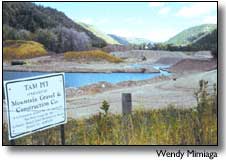|
Nov. 21, 2000
By Jim Mimiaga Journal Staff Writer The Montezuma County commissioners are being sued for their unanimous approval in September of a controversial gravel pit in the Dolores River Valley. Carol Stepe and Jack Akin filed a summons and complaint against the commission, claiming that the approval of the large gravel-mine operation by Four States Aggregate violates language in the county land-use code. Over the objections of a number of valley residents, the commissioners approved a high-impact permit for the project, which would take approximately 130,000 to 150,000 tons of gravel per year from the 19-acre site over the next five years. Rather than deny the permit outright, the commissioners put restrictions on the permit designed to mitigate its negative effects, such as noise, dust and truck traffic. They limited its hours of operation and required a $10,000 performance bond for reclamation after the five years are up. Upon receiving the complaint, filed in district court Nov. 16, the commissioners said they would be meeting with county attorney Bob Slough to form their response within the allotted 20-day time period. Commissioners Gene Story, Kent Lindsay and Kelly Wilson are named as defendants. Plaintiffs Stepe and Akin, who reside next door to the approved gravel mine, are represented by attorney Tim Tuthill. They are asking the court to invalidate the approved high-impact permit because Stepe and Akin "will be substantially affected by the noise of the gravel operation, pollution, and dust particles." The complaint cites the following as other reasons to overthrow the controversial high-impact permit: • The land-use code includes language that indicates the purpose of the code is "protect(ing) the rural character of the county" through regulations "appropriate for rural areas." According to the code, the complaint states, those standards are designed to "ensure that development does not cause significant adverse impacts" on neighboring properties in a way that increases "risk to health, safety or welfare of citizens," or that adversely reduces neighboring property values. • Stepe and Akin point to an alleged procedural fault in the application process initiated by Val Truelson, the landowner leasing land to Four States Aggregate for the purpose of mining gravel. According to the complaint, Truelson made an application for a "letter permit," a simple notice filed with the county that under the code signifies either proof of an existing business or of one that is planned. If such a business exceeds certain thresholds, under the code, the owner must apply for a high-impact permit. The complaint states that Truelson then changed his letter permit to a request for a high-impact permit, which the complaint asserts violates code language which states that "no person may change the use of land . . . . that exceeds the special status of the unincorporated areas of Montezuma County without obtaining a permit or waiver pursuant to these regulations or other development approval under the Land Use Code, except as specially exempted from this permit requirement." • The suit also alleges that the approval of the permit did not specifically outline how the project "would affect each of the items outlined in the criteria for approval of the permit." • In closing, the complaint alleges that the application was granted without complete review as stipulated in the land-use code and failed to show "findings of fact" that it was in compliance with the high impact permit. By granting the high-impact permit, the suit alleges that "the county commission exceeded their jurisdiction or abused their discretion." |
||
|
Copyright © 2000 the Cortez
Journal. All rights reserved. |
